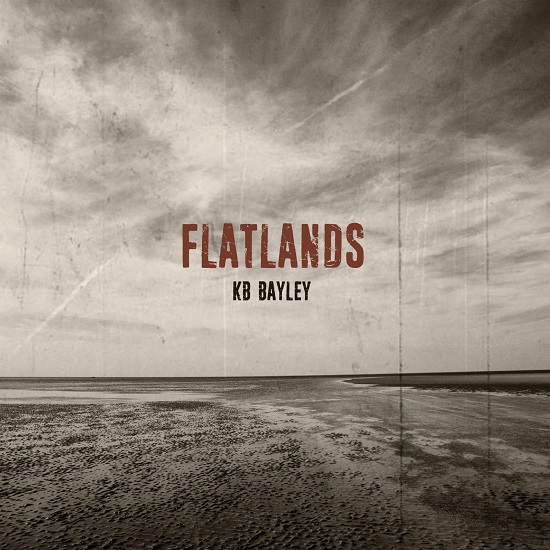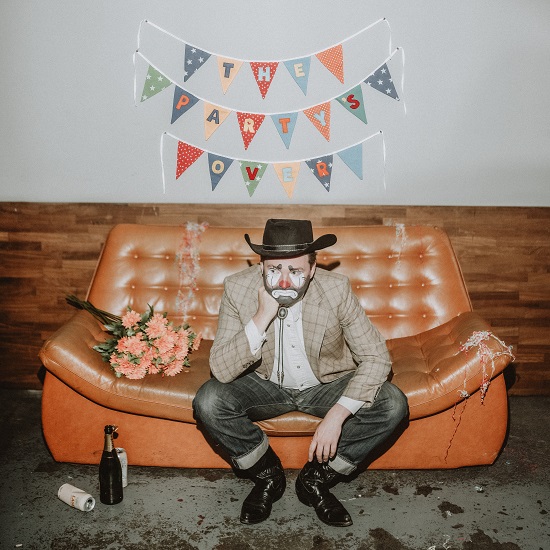
KB Bayley’s last album ‘Little Thunderstorms’ was recorded during lockdown and had a very definite UK feel with a hint of COVID claustrophobia. ‘Flatlands’ is a very different album. It’s almost a solo performance with KB underpinning his intimate vocals with some widely varied Weissenborn arrangements and a smattering of haunting harmonica from Gavin Thomas on a couple of tracks. ‘Flatlands’ has also shifted its focus to the other side of the Atlantic with four covers of American songwriters and many American references in KB’s 6 self-penned songs.
So, ten songs played almost solo by KB with just the Weissenborn. If you wanted to choose a stringed instrument that gave a varied range of backing options, the Weissenborn would be near the top of the list – open tuning and the horizontal lap playing position make it a formidable backing instrument in the hands of a good player and KB Bayley is a very good player, creating a wide variety of soundscapes to enhance the narratives. Both the vocal and the Weissenborn are close-miked; you can hear tiny string noise and KB keeps the vocal intimate and slightly raw without having to push too hard.
A sense of loss runs through the album, the damage to communities caused by progress and the yearning for those little but important moments from the past that went by almost unnoticed at the time but take on importance as time passes. Part of the American feel comes from the well-chosen covers, Jean Ritchie’s ‘The L&N Don’t Stop Here No More’, Tom Waits’ beautifully-crafted ‘Johnsburg, Illinois’, Kelly Joe Phelps’ ‘The Black Crow Keeps on Flying’ and Jason Isbell’s ‘Maybe This Time’ seems to cut across the nostalgia theme by saying we should get rid of old faiths and superstitions, echoing the starting afresh theme of KB’s own ‘Year Zero’. KB has very cleverly pulled together six of his own songs and four favourites by other artists to create a unified piece with strands of nostalgia, regret and religious references running through it. His own song ‘Driftwood Avenue’, with Gavin Thomas’ haunting harmonica contains the line “Look for what’s been lost” and the first two verses reference the loss of Art Garfunkel and Paul Simon’s friendship.
It’s not easy to create a solo album with voice and instrument (apart from the harmonica contributions) but the versatility of the Weissenborn and KB’s fingerstyle mastery create a variety of textures for the songs that make a very satisfying album.
‘Flatlands’ is released on Friday November 4th.

It’s been a while since we heard from Rob Heron (‘Soul of my City’ in 2019) for all the usual obvious reasons. The release of “The Party’s Over continues to chart the development of the band. There are similar musical and lyrical themes across the two albums; some of the songs have a retro feel, there’s a bit of a political edge at times and the lyrics are cleverly constructed. Rob has always had an eclectic blend of styles ‘The Party’s Over’ develops this further, particularly with the addition of horns on various songs to create a particular feel or evoke a particular era.
The Tea Pad Orchestra already has a wide musical palette with Tom Cronin and Ted Harbot’s combination of mandolin, harmonica, baritone guitar, upright bass and electric bass, and Colin Nicholson’s keyboards, accordion and whistle allowing the band to use surf punk, gipsy jazz, zydeco, country and string band arrangements (among others). The addition of the House of the Black Gardenia brass section adds another dimension, particularly on the album’s closer, ‘The Doctor Told Me’, a humorous tale of the dangers of excess that brings in a melancholy muted jazz trumpet in the third verse to hint at something sad to come before the horns burst in with a New Orleans jazz funeral arrangement to emphasise the death (and rebirth) of the storyteller.
The album’s incredibly varied, moving through the nonsense zydeco of ‘Snip Snap Snout’ to the slow country waltz ballad ‘Trouble Is’ to the Mexican sixties feel of ‘The Horse that You Rode In On’ – a diss track that channels Frankie Laine’s ‘Rawhide’ with humorous lyrics and trumpets and fiddle. There’s a lot going on. And that’s before the madness of ‘My Salad Days’, with its clever wordplay, baritone guitar fills and yodelled a cappella intro. The political element comes with ‘A Call to Mother’s Arms’, a string band arrangement of a song about young men being sent to fight in overseas wars, Vietnam I suspect, and coming back in coffins.
After three years, this is a cracking return from Rob Heron and the Tea Pad Orchestra. It carries on the anarchic feel of previous albums while expanding the musical palette to include soul stompers, Mexican mariachi and New Orleans jazz. You can’t argue with that.
‘The Party’s Over’ is out now on Tea Pad Recordings (TP008/TP008CD).
Here’s the video for the title track:


